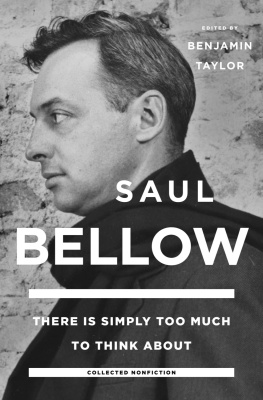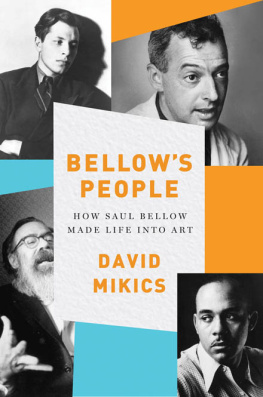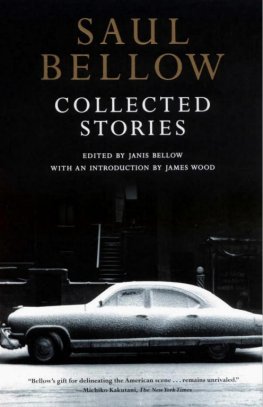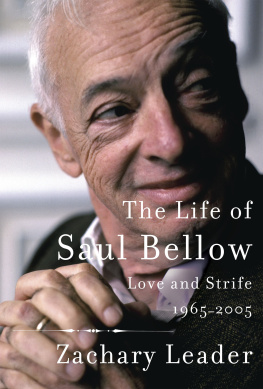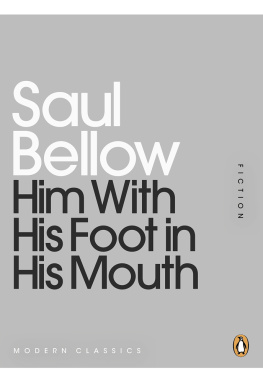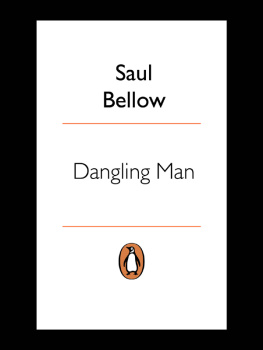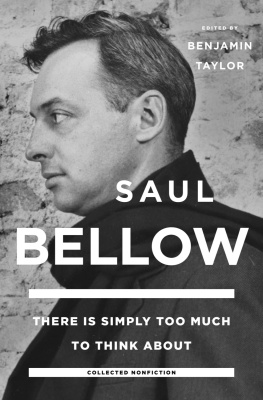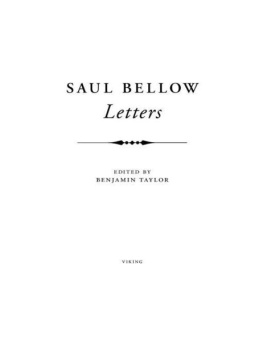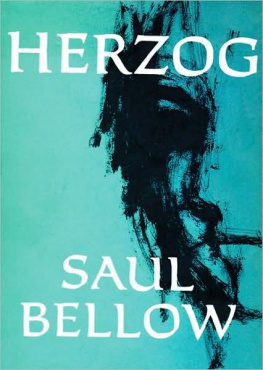ALSO BY SAUL BELLOW
Dangling Man
The Victim
The Adventures of Augie March
Seize the Day
Henderson the Rain King
Herzog
Mosbys Memoirs and Other Stories
Mr. Sammlers Planet
Humboldts Gift
To Jerusalem and Back: A Personal Account
The Deans December
Him with His Foot in His Mouth and Other Stories
More Die of Heartbreak
A Theft
The Bellarosa Connection
Something to Remember Me By
It All Adds Up
The Actual
Ravelstein
Collected Stories
Letters (Edited by Benjamin Taylor)
VIKING
Published by the Penguin Group
Penguin Group (USA) LLC
375 Hudson Street
New York, New York 10014

USA | Canada | UK | Ireland | Australia | New Zealand | India | South Africa | China
penguin.com
A Penguin Random House Company
First published by Viking Penguin, a member of Penguin Group (USA) LLC, 2015
Copyright 2015 by Janis Bellow
Penguin supports copyright. Copyright fuels creativity, encourages diverse voices, promotes free speech, and creates a vibrant culture. Thank you for buying an authorized edition of this book and for complying with copyright laws by not reproducing, scanning, or distributing any part of it in any form without permission. You are supporting writers and allowing Penguin to continue to publish books for every reader.
Acknowledgments to the original publishers of the selections in this book appear .
Some of the works were previously published in Saul Bellows It All Adds Up: From the Dim Past to the Uncertain Future (Viking Penguin, 1994). They appeared first in issues of Esquire, Forbes, Holiday, Life, The National Interest, The New York Times Book Review, The New York Times Magazine, Newsday, The Noble Savage, The Ontario Review, Partisan Review, The Reporter, The Times Literary Supplement , and Travel Holiday .
Israel: The Six-Day War (as Report on Israel) was published in Newsday , issues of June 12, 1967, June 13, 1967, and June 16, 1967. Newsday Inc., 1967. Reprinted with permission.
Nobel Lecture is published by permission of The Nobel Foundation. The Nobel Foundation 1976.
Machines and Storybooks was published in Harpers , August 1974. Copyright 1974 Harpers Magazine. All rights reserved. Reprinted by permission.
Before I Go Away: A Words and Images Interview with Norman Manea. Words & Images, 19 Derech Eretz Street, Gedera 7047119, Israel. Words & Images is a nonprofit project dedicated to the documentation and dissemination of in-depth interviews with great Jewish writers of our time who are invited to explore the connections between their oeuvre and their Jewish identity. The project is conducted in conjunction with the National Library in Jerusalem.
LIBRARY OF CONGRESS CATALOGING-IN-PUBLICATION DATA
Bellow, Saul.
[Works. Selections]
There is simply too much to think about : collected nonfiction / Saul Bellow ; edited by Benjamin Taylor.
pages cm
ISBN 978-0-698-14176-6
I. Taylor, Benjamin, 1952 editor. II. Title.
PS3503.E4488A6 2015
818'.5209dc23
2014038540
Version_1
Once you begin talking, once the mind takes to this way of turning, it keeps turning, and it dips through all events. And perhaps it makes matters slightly more tolerable to let it turn. Though I cant see why they should be tolerable. It is really a frightful moment. But what can one do? The thoughts continue turning.
Mr. Sammlers Planet
Prologue: Starting Out in Chicago
W hat was it, in the Thirties, that drew an adolescent in Chicago to the writing of books? How did a young American of the Depression period decide that he was, of all things, a literary artist? I use the pretentious term literary artist simply to emphasize the contrast between such an ambition and the external facts. A colossal industrial and business center, knocked flat by unemployment, its factories and even its schools closing, decided to hold a Worlds Fair on the shore of Lake Michigan, with towers, high rides, exhibits, Chinese rickshaws, a midget village in which there was a midget wedding every day, and other lively attractions including whores and con men and fan dancers. There was a bit of gaiety, there was quite a lot of amoebic dysentery. Prosperity did not come back. Several millions of dollars were invested in vain by businessmen and politicians. If they could be quixotic, there was no reason why college students shouldnt be impractical too. And what was the most impractical of choices in somber, heavy, growling, lowbrow Chicago? Why, it was to be the representative of beauty, the interpreter of the human heart, the hero of ingenuity, playfulness, personal freedom, generosity and love. I cannot even now say that this was a bad sort of crackpot to be.
The difference between that time and this is that in the Thirties crackpots were not subsidized by their families. They had to go it alone for several years. Or at least until the New Deal (thanks largely to Harry Hopkins) recognized that a great government could buy the solution of any problem and opened WPA projects in many parts of the country. I think it possible that Hopkins and Roosevelt, seeing how much trouble unhappy intellectuals had made in Russia, Germany and Italy between 1905 and 1935, thought it a bargain to pay people twenty-three dollars a week for painting post office murals and editing guidebooks. This plan succeeded admirably. If I am not mistaken, America continued to follow the Hopkins hint in postwar Europe and perhaps in Vietnam.
I know, for instance, that John Cheever has been conducting creative writing courses at Sing Sing. Writers and criminals have often found that they had much in common. And correctional officials seem to understand, thanks to the psychology courses they take in the universities, that it is excellent therapy to write books and that it may soften the hearts of criminals to record their experiences. Politicians, too, when they fall from power or retire, become writers or university professors. Thus Hubert Humphrey and Dean Rusk became lecturers, Eugene McCarthy became a poet and an altogether different sort of politician, Spiro Agnew, a novelist. Interviewed not long ago in The New York Times , Mr. Agnew said that, having suffered greatly, he felt the need to do something creative to recover his spirits and was setting to work writing a novel because he was not yet strong enough to do serious mental work.
But I started out to recall what it was like to set oneself up to be a writer in the Midwest during the Thirties. For I thought of myself as a Midwesterner and not as a Jew. I am often described as a Jewish writer; in much the same way, one might be called a Samoan astronomer or an Eskimo cellist or a Zulu Gainsborough expert. There is some oddity about it. I am a Jew, and I have written some books. I have tried to fit my soul into the Jewish-writer category, but it does not feel comfortably accommodated there. I wonder now and then whether Philip Roth and Bernard Malamud and I have not become the Hart Schaffner and Marx of our trade. We have made it in the field of culture as Bernard Baruch made it on a park bench, as Polly Adler made it in prostitution, as Two-Gun Cohen, the personal bodyguard of Sun Yat-Sen, made it in China. My joke is not broad enough to cover the contempt I feel for the opportunists, wise guys and career types who impose such labels and trade upon them. In a century so disastrous to Jews, one hesitates to criticize those who believe that they are making the world safer by publicizing Jewish achievements. I myself doubt that this publicity is effective.

